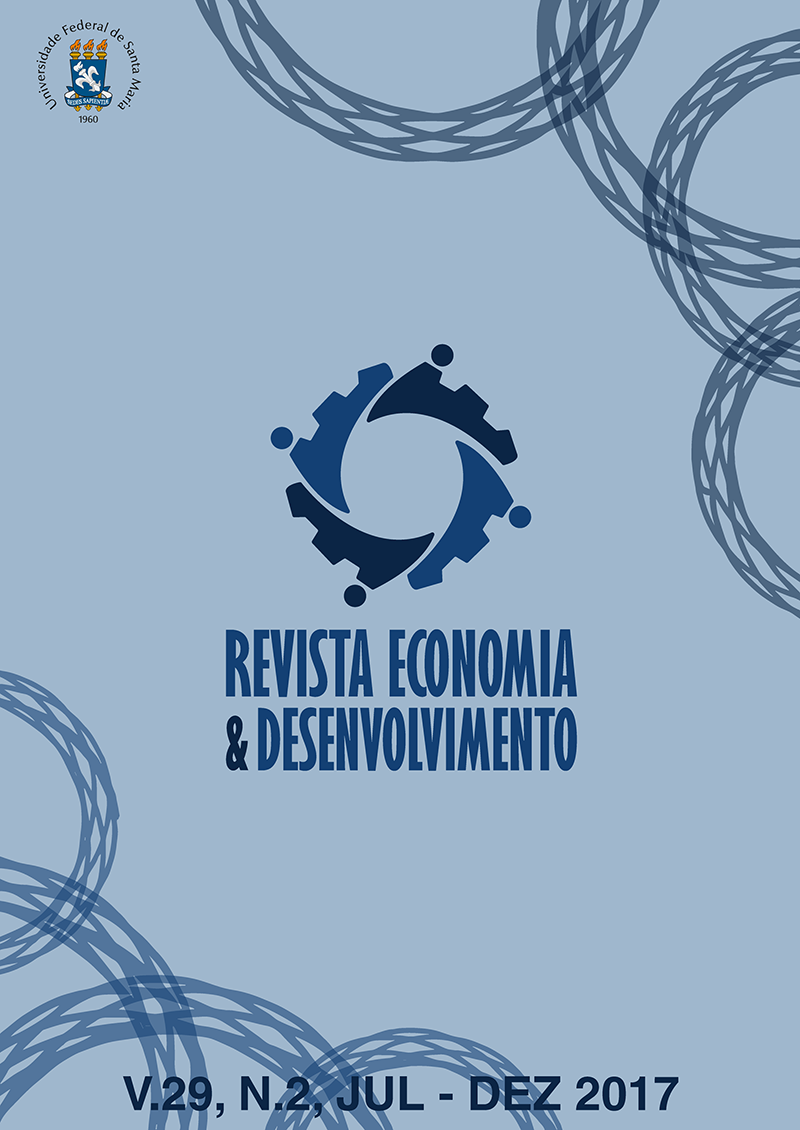RURAL CREDIT IN ESPÍRITO SANTO: ANALYSIS OF RESULTS FROM THE YEARS 2000 TO 2012
DOI:
https://doi.org/10.5902/1414650926857Keywords:
Keywords, Rural Credit, Capixaba Economics, DevelopmentAbstract
This work is a study of the rural credit policy of Espírito Santo, defined as an important tool in economic and social development by meeting the needs of producers who need resources to enable their investments. Its role is even more important in Espírito Santo, since the state of Espírito Santo is in its agricultural majority, and the effectively urbanized area is concentrated in a few cities located mainly in the metropolitan region. So, analyze and categorize the results of the rural credit policy the state is essential to understand the support that the sector is receiving through this policy. Thus, the goal is to characterize the rural credit policy in Espírito Santo state from determining the current scenario of the economy, the understanding of this agrarian policy and analysis of credit data directed to the field.
Downloads
References
BANCO CENTRAL DO BRASIL (BACEN). Anuários estatísticos do crédito rural. Brasília. Disponível em: <http://www.bcb.gov.br/?RELRURAL>. Acesso em: 16 out. 2014.
BANCO CENTRAL DO BRASIL (BACEN. FAQ - Crédito rural. Brasília. Disponível em: <http://www.bcb.gov.br/pre/bc_atende/port/rural.asp#1>. Acesso em: 16 out. 2014.
CAÇADOR, S. B.; GRASSI, R. A. A evolução recente da economia do Espírito Santo: Um Estado desenvolvido e periférico?. In: Encontro Nacional de Economia, n. 37, 2009, Foz do Iguaçu.
CAÇADOR, S. B.; GRASSI, R. A. A economia capixaba no período pós-1990: O Processo de “Diversificação Concentradora”. Revista Economia Ensaios, Uberlândia, v. 23, n. 2, 2009. Disponível em: <http://www.seer.ufu.br/index.php/revistaeconomiaensaios/issue/view/238>. Acesso em: 10 out. 2014.
CROCCO, M.; NOGUEIRA, M.; SANTOS, F. Sistema financeiro e atuação dos bancos públicos no desenvolvimento regional no Brasil. In: Bancos públicos e desenvolvimento. Rio de Janeiro, 2010
GIL, A. C. Como elaborar projetos de pesquisa. 4. ed. São Paulo: Atlas, 2008.
Instituto Brasileiro de Geografia e Estatítica - IBGE. Censo Agropecuário 2006. Disponível em: <http://www.ibge.gov.br/home/estatistica/economia/agropecuaria/censoagro>. Acesso: 10 out. 2014.
Instituto Jones dos Santos Neves. Bases de dados. Disponível em: <http://www.ijsn.es.gov.br>. Acesso em: 27 nov. 2014.
LUNDBERG, E. L. Bancos oficiais e crédito direcionado - O que diferencia o mercado de crédito brasileiro?. In: Trabalhos para discussão, n. 258, p. 1-39, Brasília, 2011. Disponível em: <http://www.bcb.gov.br/pec/wps/port/td258.pdf>. Acesso em: 16 out. 2014.
NONNENBERG, M. J. B.; REZENDE, G. C. Desenvolvimento da agropecuária do Espírito Santo. In: Instituto Jones dos Santos Neves - IJSN. Espírito Santo: Instituições, desenvolvimento e inclusão social. Vitória, 2010
PEREIRA NETO, C. VIEIRA, P. S. Crédito rural no Espírito Santo (2001-2010) e a participação do Bandes. In: II Encontro de Economia do Espírito Santo, 2011, Vila Velha.
PIRES, A. A indústria do petróleo e o caso do Espírito Santo. In: Instituto Jones dos Santos Neves - IJSN. Espírito Santo: Instituições, desenvolvimento e inclusão social. Vitória, 2010
ROCHA, H. C.; MORANDI, A. M. Cafeicultura e grande indústria: a transição no Espírito Santo. - 2.ed - Vitória: Espírito Santo em ação, 2012.
SANTO, B. R. do E. Os caminhos da agricultura brasileira. São Paulo: Evoluir, 2001
SAYAD, J. Crédito Rural no Brasil: avaliação das críticas e das propostas de reforma. São Paulo: FIPE/Pionera, 1984.
TORRES FILHO, E. T. Crédito direcionado e direcionamento do crédito: Situação atual e perspectivas. In: Revista do BNDES. Rio de Janeiro, v. 13, n. 25, p. 35-50, jun. 2006.
VERGARA, S. C. Projetos e relatórios de pesquisa em administração. 8. ed. SP: Atlas, 2007.
VILLASCHI, A. Elementos da economia capixaba e trajetórias de seu desenvolvimento. Vitória: Flor&cultura, 2011.
Downloads
Published
Versions
- 2022-07-28 (2)
- 2018-01-30 (1)
How to Cite
Issue
Section
License
The journal reserves the right of making changes in the originals in a normative order, orthographic and grammatical, with the objective of maintaining the language cult pattern, respecting the authors success. The final tests will not be sent to the authors. The published papers become the Economics and Development propriety. The opinions issued by the article’s authors are their own responsibility.







